The Columbia MBA acceptance rate is on the higher side for a top 10 school, at around 18%. Despite the deceptively high acceptance rate, Columbia is still a tough school to gain admission. I built a predictive model which can give you some insight into what the Columbia Business School admissions committee is looking for in applicants.
Columbia MBA Acceptance Rate by GMAT
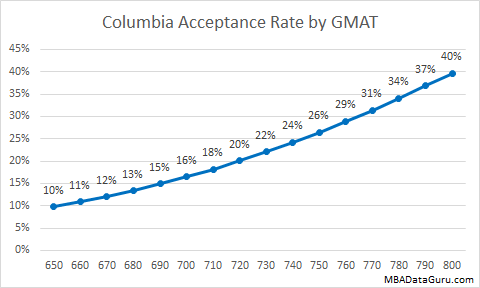 As expected, Columbia MBA acceptance rate increases as GMAT rises. The average GMAT score is an impressive 719. Increasing GMAT score by 100 points from 650 to 750 increases odds of acceptance by 140%, which is a bigger benefit than MIT.
As expected, Columbia MBA acceptance rate increases as GMAT rises. The average GMAT score is an impressive 719. Increasing GMAT score by 100 points from 650 to 750 increases odds of acceptance by 140%, which is a bigger benefit than MIT.
Columbia MBA Acceptance Rate by GPA
Surprisingly GPA has little to no affect on acceptance rate at Columbia. The average GPA of Columbia applicants is 3.49 while the GPA for those admitted is almost unchanged at 3.51. Stanford is the only other school where GPA doesn’t matter. For those of you out there with a low GPA and high GMAT, Columbia is a great school to apply.
Columbia MBA Acceptance Rate by Round
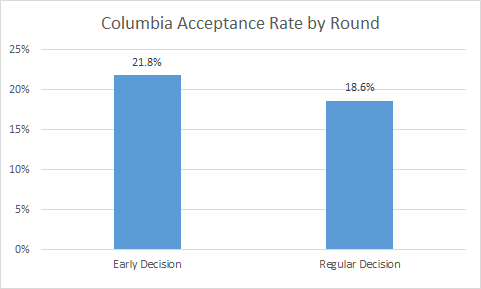 The round you apply in impacts Columbia MBA acceptance rate. At CBS, if you apply during Early Decision then you are forced to enroll if accepted. Columbia seems to be worried about yield for accepted students if they are forcing applicants to choose them. If you are serious about Columbia then consider applying Early Decision because you have a slight edge otherwise you might as well wait for regular decision. Columbia is actually rolling admissions, so the sooner you submit your app the faster you get your decision.
The round you apply in impacts Columbia MBA acceptance rate. At CBS, if you apply during Early Decision then you are forced to enroll if accepted. Columbia seems to be worried about yield for accepted students if they are forcing applicants to choose them. If you are serious about Columbia then consider applying Early Decision because you have a slight edge otherwise you might as well wait for regular decision. Columbia is actually rolling admissions, so the sooner you submit your app the faster you get your decision.
Columbia MBA Acceptance Rate by Age
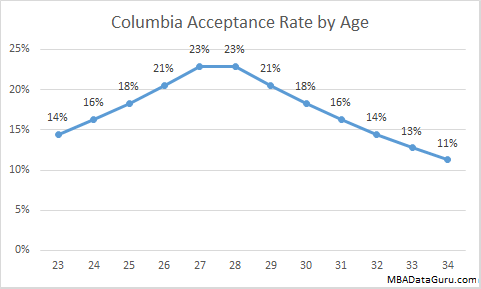 The age at which you apply has a strong impact on your chance of admission. The best time to apply is when you are 27 or 28. The further a candidate is from the average age, the lower their chance of acceptance is. I believe that this is because candidates with around 5 years of work experience have worked long enough to impress potential employers and contribute to classroom discussion while not being over qualified for on campus recruiting positions. Duke, Cornell and Booth all have a similar age effect.
The age at which you apply has a strong impact on your chance of admission. The best time to apply is when you are 27 or 28. The further a candidate is from the average age, the lower their chance of acceptance is. I believe that this is because candidates with around 5 years of work experience have worked long enough to impress potential employers and contribute to classroom discussion while not being over qualified for on campus recruiting positions. Duke, Cornell and Booth all have a similar age effect.
Other Admissions Factors
Liberal arts majors have roughly twice the acceptance rate as others. I don’t have gender in my data set but my hypothesis is that Columbia is trying to attract women which is why the acceptance rate is so high for liberal arts majors. Acceptance rate is higher for economics majors but lower for finance majors. Consultants also have a major advantage, with an impressive 30% acceptance rate.
Columbia MBA Acceptance Rate by GPA
I updated this article by request to show how Columbia acceptance rate changes by GPA. In the chart below you can see that from 3.0 to 4.0 the acceptance rate stays fairly stable, slightly above 20% for all GPAs other than 3.2 and 3.9. Shockingly the acceptance rate at 3.0 is actually higher than 4.0.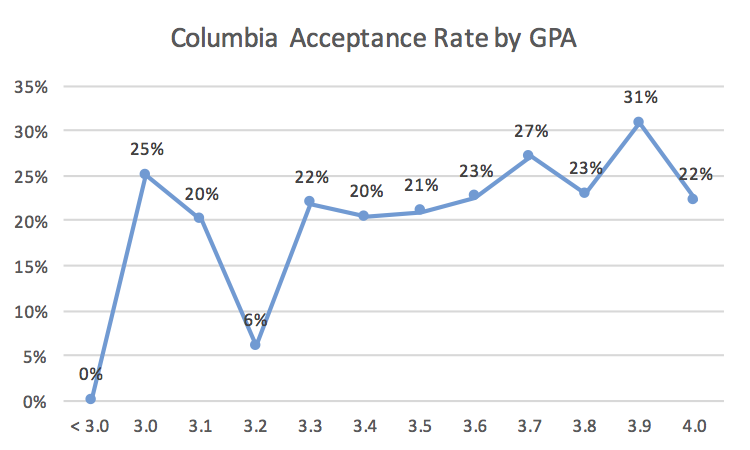
CBS Interview Invite Rate and Acceptance Rate by Round
A reader asked me how applying early vs. regular affected an applicants chance of being invited to interview and accepted after interview. It looks like applying early does not improve an applicant’s chance of being interviewed but does raise the acceptance rate if invited to interview. Approximately 40% of applicants apply through early decision.
The data for this post comes from GMAT Club.

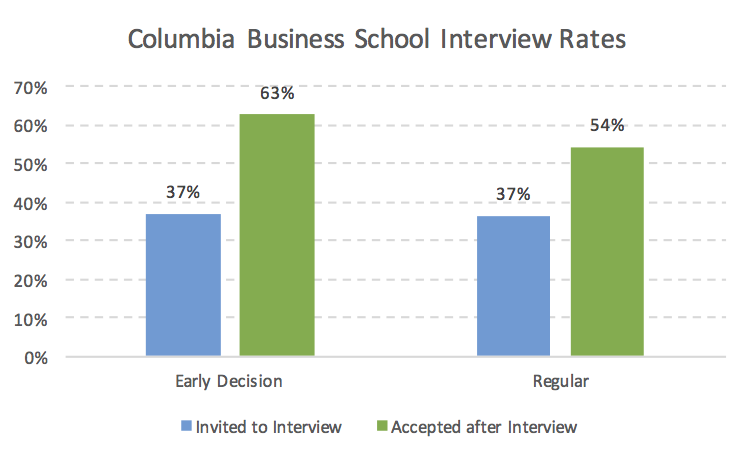
This is really helpful data, thank you for sharing it!
Is this data pulled from GMATClub or directly from the school’s reports?
I pull the data from the application thread of GMAT Club for each school. The data has to be cleaned up before I analyze it due to incomplete records and errors. I always compare the acceptance rates of my analysis to other published acceptance rates as a sanity check to make sure my data is not far off from other MBA websites.
How did acceptance rates change across GPAs? Were they consistent from 3.0 to 4.0?
Jonathon, I updated the article with a graph showing acceptance rate by GPA.
Student with GPA less than 3.0 have 0% chance?
Students can get into top schools with a GMAT below 3.0, it is just harder and there isn’t a ton of data for me to analyze. If you have a GPA below 3.0 then focus on getting the highest GMAT you can to offset your low GPA. GMAT is more important to most schools anyway.
What was the sample size used for this analysis?
My sample size is 1172 applicants.
Data Guru, Good collection of data points. Although you do show % of acceptance ED vs Regular decision, it will be useful to see how many people do get invites for an interview for both ED and RD and mention these numbers as % of people applying in each of these 2 rounds.
Lets say 1000 people aply in ED and 200 get interview invites and 150 get accepted, ED % interview invites will be 20% but the acceptance post interview invite will be 75% (=150/200). Im interested in seeing such a correlation if you have actually looked at it.
Thanks for the great work!
Hi Engr2012, ask and you shall receive. According to my data, roughly 40% of applicants apply through Early Decision. I will update the post to include your request.
Wayne,
Is the age analysis done by age at matriculation or at application?
Also, is there any correlation between age and desired post mba career? For example, per your analysis someone who is 25/26 has a lower overall admission rate but if that person was looking to go into consulting then would that impact the rate? I am assuming that consulting shops prefer to have younger individuals overall. If the average age at graduation for columbia is 30/31 but the age at graduation for those in consulting is 28/29 then it would indicate that age and industry is a factor and not just age.
I hope I made sense there haha.
It is supposed to be age at matriculation but it is self reported data and it is possible that some people may report their current age rather than at matriculation. I didn’t look at concentration vs age, but I can tell you that at my firm, age is not a factor when we select people to interview.
Also, do you have the same data (avg gmat, gpa, age) broken out by application rounds? I wonder if there is a significant difference between the quality of applicants between the ED and regular rounds.
Thanks!
Seconded!